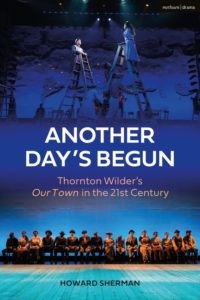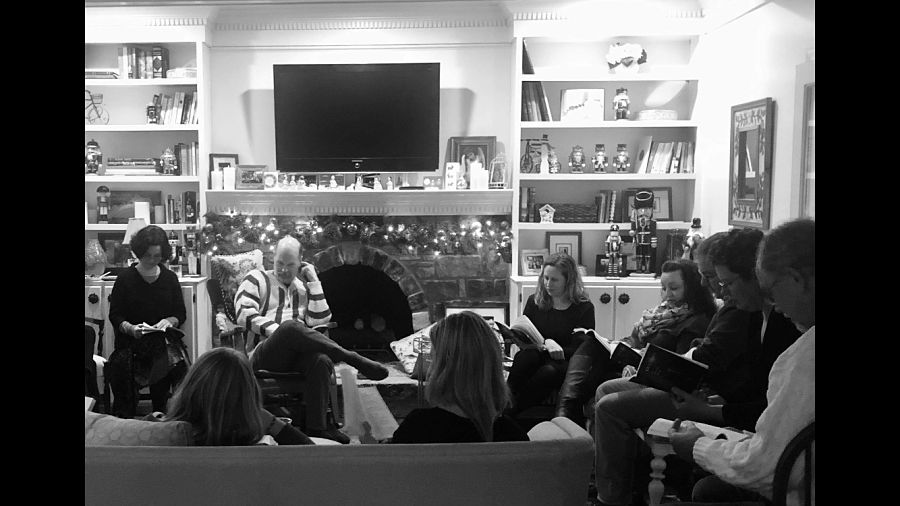The following excerpt is adapted from a chapter in Another Day’s Begun: Thornton Wilder’s ‘Our Town’ in the 21st Century, by Howard Sherman, now available from Methuen Drama.
The Church of Grover’s Corners isn’t any kind of theological institution. Taking part in its rituals in no way contravenes any religious traditions you may or may not follow. Atheists are welcome, too, after all. You see, the Church of Grover’s Corners is really an informal gathering of members of the Louisville creative community, who began coming together in 2018, roughly every other month, to read Our Town aloud. That is its only text and its sole reason for existing.
I learned of the Church of GC right after sharing on social media that I had a contract to write my first book, Another Day’s Begun: Thornton Wilder’s ‘Our Town’ in the 21st Century. While the book was focused on accounts of productions of the play in the past 19 years, this unique celebration of the play seemed pretty irresistible. I had no idea how these gatherings might end up fitting into the book, especially as the bulk of the book is oral history, but I knew I had to attend, and, though suffering severe back problems that would land me in the emergency room less than 48 hours after I got back, off I flew to Louisville.
The meetings echo some time-honored American traditions. They take place in various homes, where friends, neighbors, and even strangers are welcomed. As it is a potluck, with all in attendance bringing some manner of entrée, side dish or dessert, it could be a summer picnic. As a reading of a play in a home by a largely amateur company, it is a reminder of the days before regional theatres, when small communities, in particular, might have groups that met, not unlike a book club, to read a play aloud.

Unlike genuine religious orders, whose origins may be rooted in the distant past, with relics and apocrypha, the Church of Grover’s Corners is sufficiently new that its origins aren’t shrouded. The founders are Gregory Maupin, an actor and musician, and Tara Anderson, a producer of live events and public radio programming. They’re right there at meetings, appreciated but not necessarily revered.
The very first Church meeting took place on Feb. 11, 2018. In written remarks that day, Maupin talked about his experience of playing the alcoholic choirmaster Simon Stimson in a production of Our Town at Actor’s Theatre of Louisville, the city’s largest professional producing theatre, in 2014. He described how the company remained on stage even when they weren’t in particular scenes.
“I never once got tired of hearing this play,” Maupin said. “These words, these generous thoughts about humans and how they work, and kindness and appreciation, and how all these particular-though-fictional details of a specific day in a specific place in a specific era told many truths that feel universal.”
By the time of the eighth meeting in March 2019, at Anderson’s home, Maupin was no longer relying on notes. His somewhat looser narrative about the origins of the Church continued: “We had a bunch of sort of godless theatre heathens backstage, who had a conversation. ‘You know, this is the church that I would go to. We’ve been doing this every morning [student performances] except Mondays and pondering the sort of things that this play makes you ponder. Let’s just get together and do this once a month.’”
After experiencing the first gathering, as Maupin told the two dozen or so March 2019 attendees, “As anyone here who has been in the cast of a show knows—there is something about the repetition. There is something about the definition of ritual that is going with intention to do a thing again and again and again.”
The assignment of roles for each meeting of the Church is handled by Maupin and Anderson; it varies from meeting to meeting. There is no effort to adhere to age, gender, ethnicity, race, disability, or sexuality as written; if someone wants to play a role, they ask for it, and, especially if they’ve not read it before at a Church meeting, they’re quite likely to get to do it. When I planned my visit, I was seized by hubris. I asked if I could read the Stage Manager.
Being within the play, even if only for one reading, in a charming suburban living room, was revelatory. It’s not so much that I heard the play differently; it’s that the moment I knew I would read this role, I flashed back to my high school theatre days. I suddenly had what I’ll call “actor brain.”
For my purposes, actor brain is when you focus first and foremost on what you have to do. In most plays, one is considering how they might play scenes with others. In the case of Our Town, actor brain reveals something quickly, if it wasn’t obvious to me before. Save for a handful of lines in Act III—and when the Stage Manager steps into playing other characters—it is a role of monologues, of direct address.
Do audiences ever realize this as they watch the play? Do they stop to think how unnatural this might be? It’s a character predominantly talking to the audience, parceling out information.
As I read, Maupin’s invocation of ritual certainly took hold, as I spoke aloud for the first time words of Wilder’s which I have always found most beautiful and meaningful.
“This is the way we were,” said the Stage Manager, “in the provinces North of New York at the beginning of the 20th century. This is the way we were: in our growing up and in our marrying and in our living and in our dying.”
Our Town has been playing on stages across the world since the end of the original Broadway run in 1938. It has become a ritual, a tradition, interpreted, reinterpreted, misinterpreted, over four score years and counting. It may well be our secular liturgy, and only the folks in Louisville have recognized it as such, or at least done something about it.
Howard Sherman is the U.S. columnist for The Stage newspaper in London and the former executive director of the American Theatre Wing and O’Neill Theatre Center. This excerpt is published with permission.


